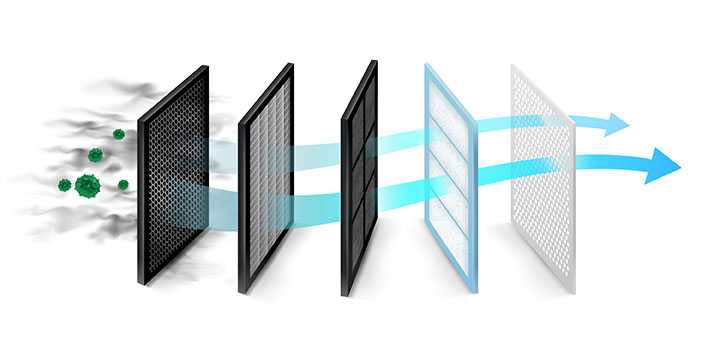

A filter is a device that separates particles of different sizes. It can be used to remove unwanted substances from a liquid or gas.
The filtering process is based on the principle that particles of different sizes will be able to pass through a filter to different degrees. For example, a filter with large holes will allow large particles to pass through but will trap small particles. A filter with small holes will trap large and small particles but will allow very small particles to pass through.
The filtering process is often used to purify water. Water filters can remove dirt, germs, and other unwanted substances from water. They can also be used to remove chemicals from water.
Filters are also used in many other applications, such as air purification, food processing, and industrial manufacturing.
The water filter removes impurities from the water.

Noun: filter, filters.
Verb: filter, filtered, filtering.
Adjective: filterable.
The word "filter" is derived from the Latin word filtrum, which means "a strainer". The Latin word filtrum is thought to be derived from the Proto-Indo-European root *pel-, which means "to drive, push".
Why are filters useful?
Question:
Explain the purpose and functioning of filters in various scientific and everyday applications. Describe the different types of filters and their specific uses in separating substances or removing impurities. Provide real-life examples of filters used in different contexts.
Answer:
Filters are essential devices used in various scientific and everyday applications to separate substances or remove impurities from a mixture. They work by allowing certain components to pass through while retaining others based on size, solubility, or chemical properties. There are different types of filters, including paper filters, sieves, and membrane filters.
In laboratories, paper filters are commonly used to separate solid particles from liquids in processes like filtration. Sieves are used in industries for separating different-sized particles, such as flour and sugar in food processing. Membrane filters are employed in water purification systems to remove bacteria and other contaminants.
In everyday life, coffee filters are used to separate coffee grounds from brewed coffee, and air filters in HVAC systems help clean and purify the air we breathe.
Overall, filters have widespread applications in various fields, ensuring the efficient separation of substances and the removal of impurities for diverse purposes.
Address
Developing Experts Limited
Exchange Street Buildings
35-37 Exchange Street
Norwich
NR2 1DP
UK
Phone
01603 273515
Email
hello@developingexperts.com
Copyright 2025 Developing Experts, All rights reserved.